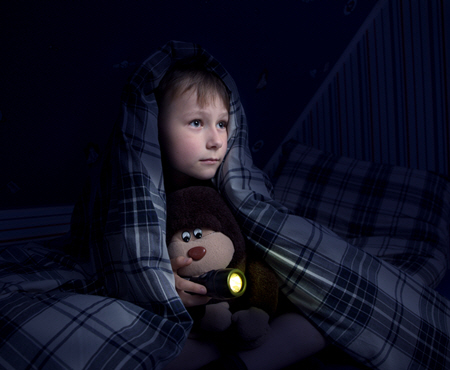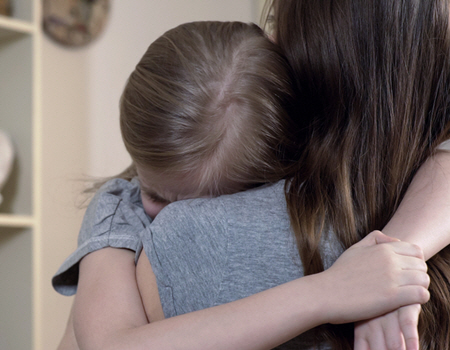 It’s not the family’s fault!
It’s not the family’s fault!
Obsessive-Compulsive Disorder (OCD) starts with a genetic predisposition and can get reinforced by normal childhood activities.
All children have some magical thinking and often have big imaginations. Also, childhood can have things that are scary and unfamiliar, as children don’t have much experience in life.
Combine these two truths about childhood, and the chance is high that a child will “learn” how to handle these fears through some means, often in a magical type of way.
Take for instance, a child hears a noise while in bed after the house is asleep. That child will likely be frightened and may even invent a very scary scenario (this is where the imagination comes in), because children don’t have enough experience to know of all the possible real sources of a noise in the night, like adults do.
After this child is properly frightened and sitting in a lot of anxiety, suppose that child decides to kiss all his stuffed animals to feel safer and it works! His anxiety starts to go away. The child actively learns that “kissing all my stuffed animals makes me feel safe” or even stronger.
This is where OCD comes in, and that thought with its ritual of having to kiss all the stuffed animals before bed becomes absolutely necessary for the child to not be anxious and to be able to sleep without worrying that something bad will happen during the night.
This is one simple way of how OCD can use normal occurrences of childhood to gain strength until it is in control of much of the child’s life and/or the family’s life.
 “Why is my child freaking out?!”
“Why is my child freaking out?!”
Not all children develop OCD, but some are more genetically predisposed to fall into these types of learning patterns. So, the OCD gets solidified through no fault of anyone. Parents might notice that their child seems to overreact to settings and situations – and no amount of teaching or consoling can help the child calm down.
Some children just seem to have their throttle set a little higher… making little things become much bigger, much faster. This is one of the effects of OCD: the “catastrophizing” of normal fears and worries.
Often OCD can manifest in a child’s life through the child needing to be in control of his environment, which can be draining on the family. Or perhaps OCD makes your child need to redo their work at school, erasing, rewriting, erasing, rewriting, until it is “just right.” Or maybe your child has elaborate routines that must be performed before certain times like leaving for school, dinner, or bedtime.
I know this is all very confusing…
Many parents that bring their children to therapy can feel like failures.
At first the accommodation that you gave your child felt right, because your child was so distraught. Every parent hates to see their child in such distress and/or anger.
But eventually, you may start to wonder how you got where you are and how can you solve it? You realize that all the things you try to help your child change to not be so distressed don’t work, and they make you feel helpless and sad.
Likely, you have tried getting angry, imposing consequences, coaxing, and rewards. All the tools in a parent’s arsenal. And still your child digs in his or her heels and not much changes.
And I know that, as a parent, you might be at your wits’ end over what to do.
I know you’re here now, because you would do anything to help your child feel better and not be so anxious or defiant.
 The best news about OCD is that it is treatable.
The best news about OCD is that it is treatable.
A large part of treatment is education – for both support of the parents and the child.
The most effective treatment that conquers OCD is Exposure and Ritual Prevention therapy. The hard part of this therapy is that it is 100% your child’s work to do. You cannot force your child to do this work any more than you can force him or her to let go and not do the things that OCD is urging them to do.
Exposure and Ritual Prevention means that your child will be guided, through our work together, to face his or her fears without doing any of the rituals to take the anxiety or distress away. We practice together doing the things that OCD says not to do; and your child learns that even by disobeying OCD, nothing bad happens.
The activities we practice depend on exactly what the OCD is saying, but an example might be as simple as the child writing their name very sloppily over and over again until the anxiety of this goes away. The work can be creative, and I have found that most children enjoy figuring out ways to disobey the OCD!
Treatment starts with small things and works up to the big things as the child’s confidence grows. In therapy, we celebrate every victory over OCD no matter how seemingly small.
Usually after the child has had some success in office, they are more willing to stand up to the OCD at school, at home, and at other places that OCD tries to exert dominance. An example of this could be after the child had practiced writing their name “wrongly” in session; at school, they can then quickly move past the urge to erase and rewrite their name on their assignments in school.
More about my approach with your child…
I’ll always speak to your child in the most truthful and straightforward way about OCD… and what it takes to conquer their fears. Armed with more information, a child is more willing to lean into the fears instead of using all the compulsions to avoid them.
I’ll make learning about OCD as active as possible, making therapy an engaging experience where their natural curiosity and childlike thinking are an advantage.
I never “push” my clients. OCD often feels like a bully making the child continually do things that they don’t want to do… or telling them all sorts of bad things over and over.
I work in a collaborative way with your child to figure out exercises and activities that they can manage and have success against the OCD. I am always willing to hear, “No, I’m not quite ready for that yet.”
Usually after a person declines an idea of mine, I am quick to praise their ability to care for themselves (a solid “no” is very important in life), and the client is usually able to come up with a different exposure exercise that they do feel able to accomplish. This builds trust and confidence in the client, both of which are very important to success. In general, no one likes having their boundaries pushed through by anyone.
 OCD doesn’t have to run the show!
OCD doesn’t have to run the show!
No shame and no blame!
Perhaps, you have worried that a therapist will judge your accommodations of OCD in your family or how you are handling it or not handling it, and you are embarrassed. Likely, you are at your wits’ end, and you are past caring what people will think. You just want to find some help and relief for your child.
Not being able to help your child change can make you feel helpless and make you wonder about your own abilities to solve problems and take care of your children. None of these things are true – OCD doesn’t respond to reassurance, logic, or problem solving. It just doesn’t. It does respond to exposure therapy and ritual prevention, and it is something I have taught many children and their parents – because it works!
Let’s start helping your child learn that they have what it takes to conquer their fears!
Call me today at (970) 541-2862.

